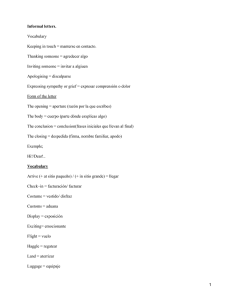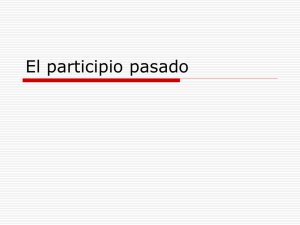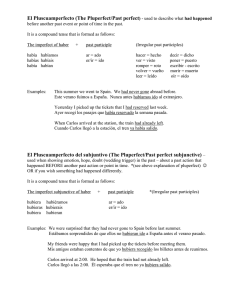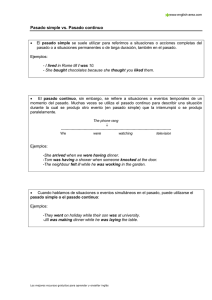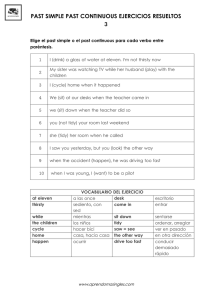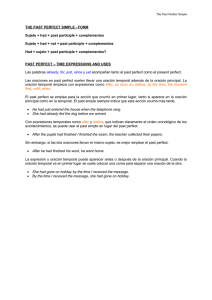FORM USES TIME EXPRESSIONS
Anuncio
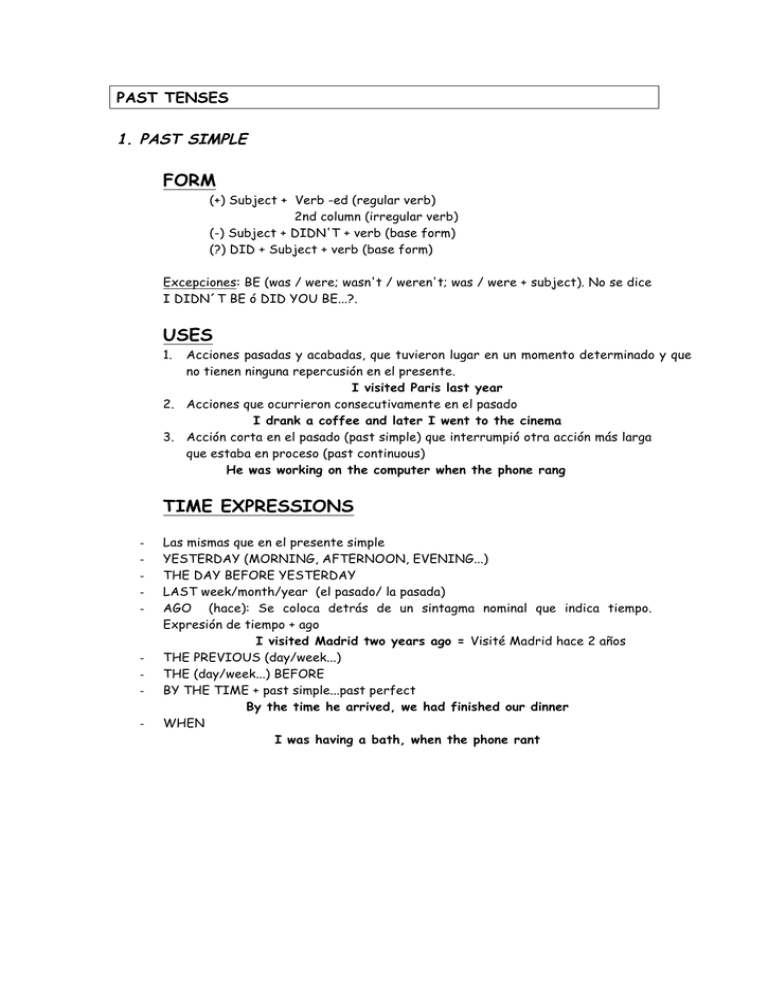
PAST TENSES 1. PAST SIMPLE FORM (+) Subject + Verb -ed (regular verb) 2nd column (irregular verb) (-) Subject + DIDN'T + verb (base form) (?) DID + Subject + verb (base form) Excepciones: BE (was / were; wasn't / weren't; was / were + subject). No se dice I DIDN´T BE ó DID YOU BE...?. USES 1. Acciones pasadas y acabadas, que tuvieron lugar en un momento determinado y que no tienen ninguna repercusión en el presente. I visited Paris last year 2. Acciones que ocurrieron consecutivamente en el pasado I drank a coffee and later I went to the cinema 3. Acción corta en el pasado (past simple) que interrumpió otra acción más larga que estaba en proceso (past continuous) He was working on the computer when the phone rang TIME EXPRESSIONS - - Las mismas que en el presente simple YESTERDAY (MORNING, AFTERNOON, EVENING...) THE DAY BEFORE YESTERDAY LAST week/month/year (el pasado/ la pasada) AGO (hace): Se coloca detrás de un sintagma nominal que indica tiempo. Expresión de tiempo + ago I visited Madrid two years ago = Visité Madrid hace 2 años THE PREVIOUS (day/week...) THE (day/week...) BEFORE BY THE TIME + past simple...past perfect By the time he arrived, we had finished our dinner WHEN I was having a bath, when the phone rant 2. PAST CONTINUOUS FORM (+) Subject + WAS/WERE + Verb -ing (-) Subject + WASN'T / WEREN'T + Verb -ing (?) WAS / WERE +Subject + Verb -ing USES: 1. Acción que estaba ocurriendo (pero no estaba concluida) en un momento específico del pasado. At around 8 o’clock last night, Charles was surfing the Net 2. Acción larga (past continuous) que estaba ocurriendo cuando fue interrumpida por otra acción más corta (past simple). Puede utilizarse WHEN o WHILE I was having a bath when Mary arrived While I was having a bath, Mary arrived 3. Dos o más acciones que estaban sucediendo simultáneamente en el pasado. En este caso, la oración subordinada suele empezar con la conjunción WHILE. While Nick was chatting, Terry was doing her homework Nick was chatting while Terry was doing her homework 4. Acciones pasadas repetidas y monótonas, denotando que nos desagradaban. He was always watching television EXPRESIONES TEMPORALES: - WHILE/AS= mientras While/As I was watching TV, my sister was listening to music - AS/ WHEN=cuando. As I was living in London, I met a lot of people * El verbo que le sigue a WHILE/AS suele ir en pasado continuo y el que le sigue a WHEN puede ir en pasado simple o pasado continuo. - YESTERDAY= ayer. Yesterday morning, afternoon, evening… - LAST= el pasado/la ex. I was studying Maths last week - AT THAT MOMENTO - ALL day/night... - THE WHOLE day/night/month...(todo el/la...) - DURING 3. PAST PERFECT FORM (+) Subject + HAD+ past participle (-ed si es un verbo regular y 3rd columna si es un verbo irregular) (-) Subject + HADN'T + past participle (?) HAD + Subject + past participle Se corresponde con el pretérito pluscuamperfecto en castellano. Se traduce como HABÍA+PARTICIPIO USES 1. Para hablar de una acción pasada (past perfect) que ocurrió antes que otra acción también pasada (past simple) Fortunately, I had already sent my e-mail before my computer broke 2. Con el adverbio JUST para expresar acciones que acababan de ocurrir When my mother phoned, the children had just gone to bed TEMPORAL EXPRESSIONS - Las mismas que aparecen con el presente perfecto: for/since, already/yet, just... - UNTIL/TILL (hasta) He didn't go to bed until the film had finished - AS SOON AS (Tan pronto como) As soon as Mary had left, I phoned Jonathan - EARLIER (antes) - THE PREVIOUS day/week/month... - AFTER/BEFORE. * Before + past simple... past perfect Before he arrived, he had finished his homework * After + past perfect... past simple After he had passed his exam, he got his driving licence COMPARE: When I arrived home my mother made lunch When I arrived home my mother had made lunch 4. PAST PERFECT CONTINUOUS FORM (+) Subject + HAD + BEEN + verb -ing (-) Subject + HADN'T + BEEN + verb -ing (?) HAD + subject + BEEN + verb -ing USES 1.- Se utiliza para subrayar la duración de una acción que ocurrió en el pasado antes que otra. She was so ill because she had been eating too many chocolates for two hours TEMPORAL EXPRESSIONS - Las mismas que aparecen con el presente perfecto: for/since, already/yet, just... - THAT/THOSE week(s), month(s), year(s)... : Mary had been studying French that year - SINCE WHEN...?: Since when had you been living in Spain? - UNTIL/TILL (hasta) He had been playing football until ten o'clock
